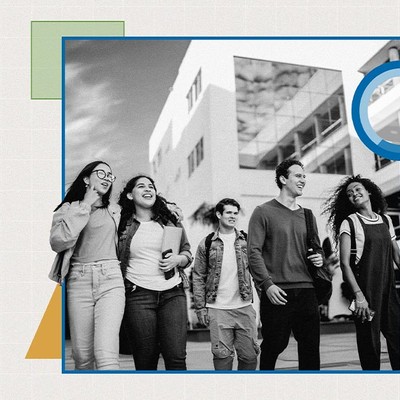WASHINGTON, D.C. — Gen Z students are feeling more prepared for their futures than at any point in the past three years, according to a new survey from the Walton Family Foundation and Gallup Voices of Gen Z study. Nearly six in 10 middle and high school students now agree they feel prepared for the future, an 11-percentage-point increase over 2024.
The survey, conducted May 16-27, 2025, with 1,687 13- to 18-year-olds enrolled in grades six through 12, finds Gen Z boys and girls are equally confident in their readiness for the future (58%), while Black students (67%) are more confident than their White peers (54%). Asian (58%) and Hispanic (61%) students’ preparedness for the future is statistically similar to that of Black and White students.
While the youngest members of Gen Z get closer to graduation each year — presumably gaining more knowledge and experience as they do — this does not explain the significant increase in middle and high school students’ feelings of preparedness. To the contrary, in prior years of the Voices of Gen Z study, high school students reported lower levels of confidence than their middle school peers. Though this remains true in 2025 — 60% of middle school students agree they feel prepared for the future, compared with 57% of high school students — confidence increased significantly among both groups of students, with a 13-point increase among middle school students and an 11-point increase among high school students compared with 2024. Despite these improvements, a significant share of students (43%) still do not agree they are prepared for the future, pointing to potential gaps in educational experiences that support long-term readiness.
Gen Z Students’ Life Evaluation Shows Modest Progress
The survey also finds 56% of middle school and high school students are now considered “thriving” in their overall life evaluation, a measure of how positively they rate their current lives and their expected lives five years from now. The current figure is in line with the 55% of Gen Z students who were thriving in 2024 but is slightly higher than the 53% of students who were thriving in 2023.
More middle school students (60%) than high school students (54%) are thriving based on their life evaluations, while Asian (63%) and Black (61%) students are more likely to be thriving than their Hispanic (49%) and White (55%) peers. Meanwhile, equal shares of Gen Z boys and girls are thriving (56%).
Classroom Engagement Contributes to Stronger Wellbeing and Future Readiness
Since 2023, the Voices of Gen Z study has measured eight aspects of students’ engagement in the classroom, including the extent to which they find what they learn interesting and challenging, whether their teachers are encouraging their growth, and whether their schoolwork allows them to exercise their strengths and talents. In 2025, all eight measures of school engagement reached their highest levels to date, with the largest increases occurring in the percentage of students who agree that school gives them the opportunity to do what they do best (50%, versus 40% in 2023) and that they have a teacher who makes them excited about the future (78% versus 70%).
Historically, engagement has been lower among high school students than among middle school students. It is notable, then, that increased engagement in 2025 is primarily due to high school students reporting significant improvements in their experience. Compared with 2023, every measure of engagement increased by six to 14 percentage points among high school students. Over the same period, middle school students have reported changes in engagement ranging from a two-point decrease to a six-point increase. Following these shifts, high schoolers are now at least as likely as middle schoolers, if not more so, to agree they are having each of the eight engaging experiences.
While these improvements represent a step in the right direction, significant percentages of students still report lacking critical aspects of their school experience. About half of students do not agree that their coursework gives them the opportunity to do what they do best, about four in 10 say it does not challenge them in a good way, and just over one in three students do not feel they have learned anything interesting in the last seven days.
As in prior years, the Voices of Gen Z data show that students who have more of these engaging classroom experiences are also more likely to report positive outcomes in their wellbeing and readiness for their postgraduation lives. Students who agree that they have had at least five of the eight engaging experiences in school are significantly more likely to be thriving in their lives and prepared for the future; however, one in three students (34%) report having fewer than five of the experiences.
Implications
The third annual administration of the Voices of Gen Z study finds that middle and high school students are feeling significantly more prepared for their futures and are rating their lives slightly more positively than they did in the prior two years. This coincides with notable improvements in their engagement in the classroom, a metric that is strongly correlated with their life evaluation and future readiness. While these developments may be cause for cautious optimism, there are still many students who continue to feel like what they learn in the classroom is not sufficiently interesting, challenging or conducive to their natural talents and strengths. Finding ways to deliver a meaningful educational experience for these students — which, according to students, often starts with the engagement and excitement of their teachers — will help ensure that this positive momentum continues and the next generation feels adequately prepared to embark on whichever postgraduation path they choose.
Stay up to date with the latest insights by following @Gallup on X and on Instagram.
Learn more about how the Voices of Gen Z study works.





